Here are some events that happened on August 5th. It could be an event or a person that died or was born on that day
1802 Born: Niels Henrik Abel, Norwegian mathematician and theorist (d. 1829)
Niels Henrik Abel (5 August 1802 – 6 April 1829) was a Norwegian mathematician who made pioneering contributions in a variety of fields. His most famous single result is the first complete proof demonstrating the impossibility of solving the general quintic equation in radicals. This question was one of the outstanding open problems of his day, and had been unresolved for over 250 years. He was also an innovator in the field of elliptic functions, discoverer of Abelian functions. He made his discoveries while living in poverty and died at the age of 26 from tuberculosis.
Most of his work was done in six or seven years of his working life. Regarding Abel, the French mathematician Charles Hermite said: "Abel has left mathematicians enough to keep them busy for five hundred years." Another French mathematician, Adrien-Marie Legendre, said: "quelle tête celle du jeune Norvégien!" ("what a head the young Norwegian has!").
The Abel Prize in mathematics, originally proposed in 1899 to complement the Nobel Prizes, is named in his honour.
Norwegian stamps depicting Niels Henrik Abel
1850 Born: Guy de Maupassant, French short story writer, novelist, and poet (d. 1893)
Henri René Albert Guy de Maupassant (5 August 1850 – 6 July 1893) was a 19th-century French author, remembered as a master of the short story form, and as a representative of the Naturalist school, who depicted human lives and destinies and social forces in disillusioned and often pessimistic terms.
Maupassant was a protégé of Gustave Flaubert and his stories are characterized by economy of style and efficient, seemingly effortless dénouements (outcomes). Many are set during the Franco-Prussian War of the 1870s, describing the futility of war and the innocent civilians who, caught up in events beyond their control, are permanently changed by their experiences. He wrote 300 short stories, six novels, three travel books, and one volume of verse. His first published story, "Boule de Suif" ("The Dumpling", 1880), is often considered his masterpiece.
French stamp and First Day Cover depicting Guy de Maupassant
1895 Died: Friedrich Engels, German philosopher (b. 1820)
Friedrich Engels (28 November 1820 – 5 August 1895) was a German philosopher, historian, communist, social scientist, sociologist, journalist and businessman. His father was an owner of large textile factories in Salford, England, and Barmen, Prussia (now Wuppertal, Germany).
Engels developed what is now known as Marxist theory together with Karl Marx and in 1845 he published The Condition of the Working Class in England, based on personal observations and research in English cities. In 1848, Engels co-authored The Communist Manifesto with Marx and also authored and co-authored (primarily with Marx) many other works. Later, Engels supported Marx financially, allowing him to do research and write Das Kapital. After Marx's death, Engels edited the second and third volumes of Das Kapital. Additionally, Engels organised Marx's notes on the Theories of Surplus Value, which were later published as the "fourth volume" of Das Kapital. In 1884, he published The Origin of the Family, Private Property and the State on the basis of Marx's ethnographic research.
Engels died in London on 5 August 1895, at the age of 74 of laryngeal cancer and following cremation his ashes were scattered off Beachy Head, near Eastbourne.
Stamps from East and West Germany depicting Friedrich Engels
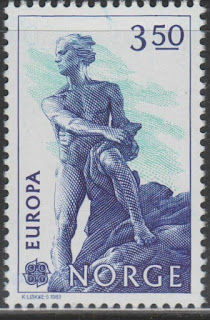
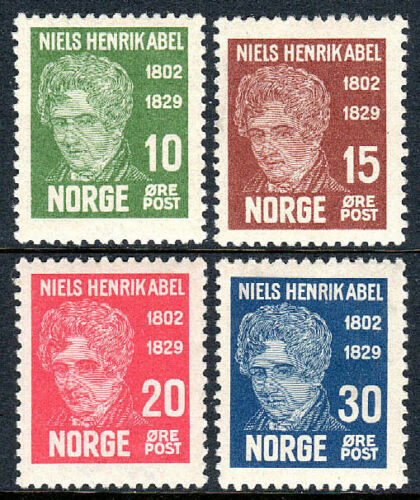

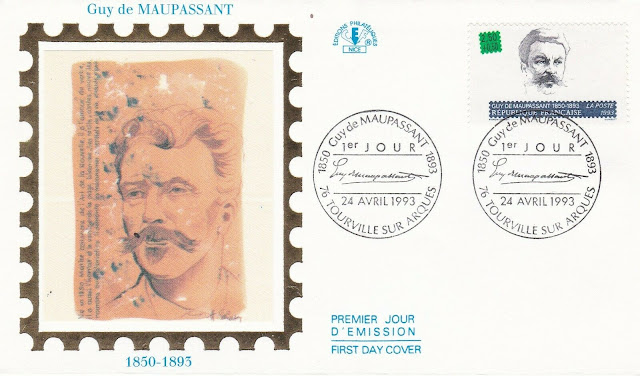

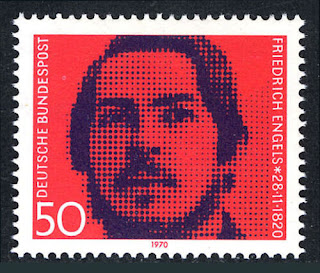
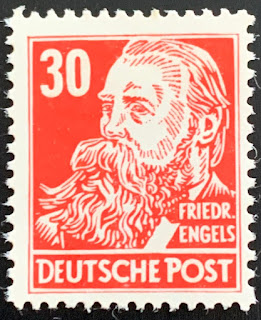

No comments:
Post a Comment